6 Tips for How to Store Dried Herbs for Long-lasting Flavor
Knowing how to store dried herbs is an important skill if you want long lasting flavour. I love using fresh or dried herbs in cooking; they can take a dish from ho hum to wow. But, in order to get the wow factor, dried herbs have to keep their potency. Eventually, time will strip all dried herbs and spices of their essential oils, but storing them properly can delay that as long as possible.
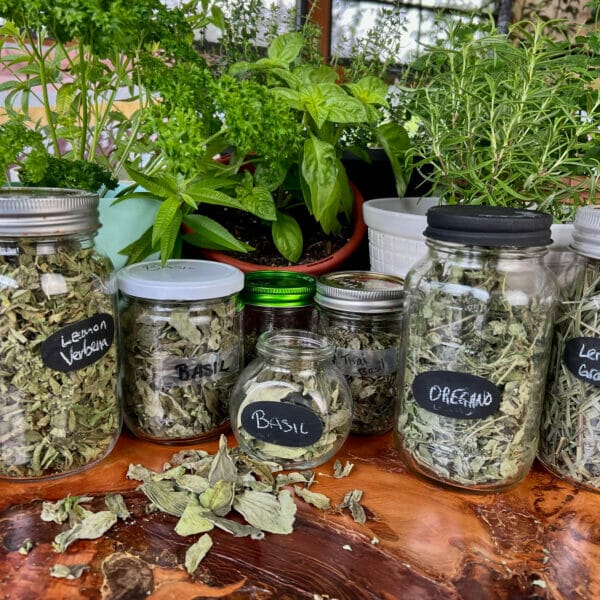
Also try: Homemade Seasoning Blends, Homemade Finishing Salts, Infused Vinegar, Infused Simple Syrup
Top 6 Tips for Storing Dried Herbs
1. Understand what causes dried herbs to lose flavour.
Knowing the enemies of dried herbs can help you understand what you need to do to store them effectively.
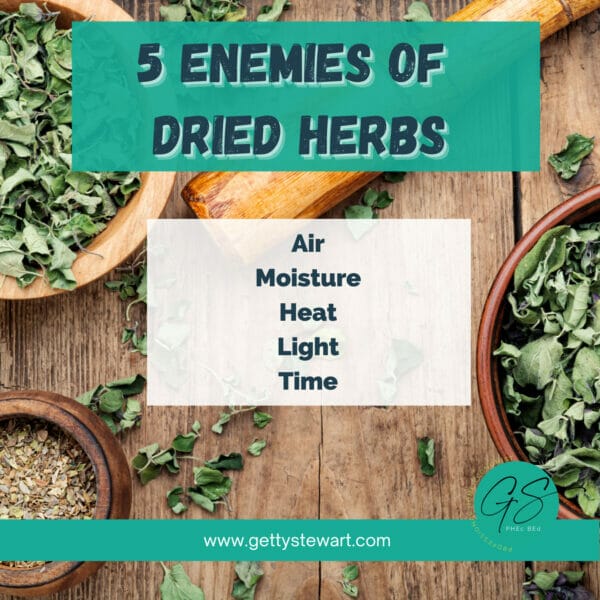
The 5 Enemies of Dried Herbs are...
- Air – oxygen degrades herbs, so keep them whole and sealed air tight
- Moisture – low humidity is key, if even a little moisture gets in your dried herbs there’s a risk of mold
- Heat – cool temps extend the shelf life of herbs
- Light – light, especially sunlight will erode herb colour and flavour
- Time – no matter how good your storage conditions, over time herbs will lose their flavour
Pro Tip: Check the freshness of your dried herbs by crushing them in your palm. If you get a strong scent of the herb, they’re great and will continue to add flavour. If you get just a wee hint of the herb, they’re nearing the end of their usefulness and you may need to add more than the recipe calls for. If there’s no scent or just a random dried green leaf scent, it’s time to replace it.
2. Store in Airtight Containers
I prefer glass jars with tight sealing lids because they do not let any air or moisture in or out. You can also use metal or plastic containers, just make sure they can be sealed tightly. Plastic bags are a little more risky, they can get tiny pin prick size holes or the seal may come undone, I don’t recommend them.
Paper bags are great while drying herbs, but once herbs are completely dry it is best to transfer them to an airtight container. Paper bags may let moisture back into the herbs if humidity levels change.
3. Store Whole Leaves, Not Crushed
Herbs have tiny cells that hold in their essential oils. It’s these essential oils that provide the aroma and flavour we want. When you crush herb leaves, you break open those tiny cells and expose them to enemy #1 – air! The air causes the essential oils to waft away leaving you with flavourless herbs. By storing whole leaves vs crushed leaves, more of the essential oils stay in the herbs.
To ensure herb flavour goes into your food, not in the air, crumble your dried herbs just before adding to your food, not when you put them in your airtight container for storage.
Yes, it will take up more space to store whole herb leaves than crushed leaves, but trust me! It’s worth it.
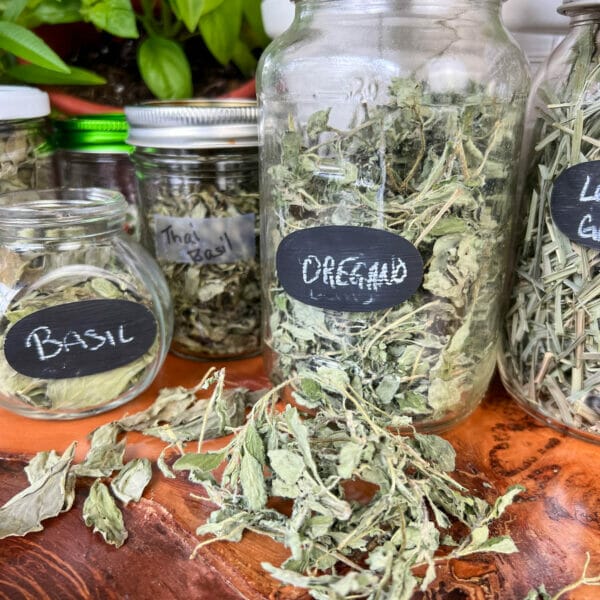
4. Use the Right Sized Container
As part of your strategy to prevent as much air as possible at getting to your herbs, use a jar or container that’s just the right size so there isn’t a lot of empty air space.
If you have a vacuum sealer to remove excess air of jars you’re storing for an extended time, that’s great. Go for it! But it’s not necessary, just use the right sized container.
5. Keep out of Direct Light
Store your herbs in a dark cupboard or room. It looks pretty to have jars decorated with burlap, ribbons and cute labels stored in your kitchen, but light, especially direct sunlight destroys flavour!
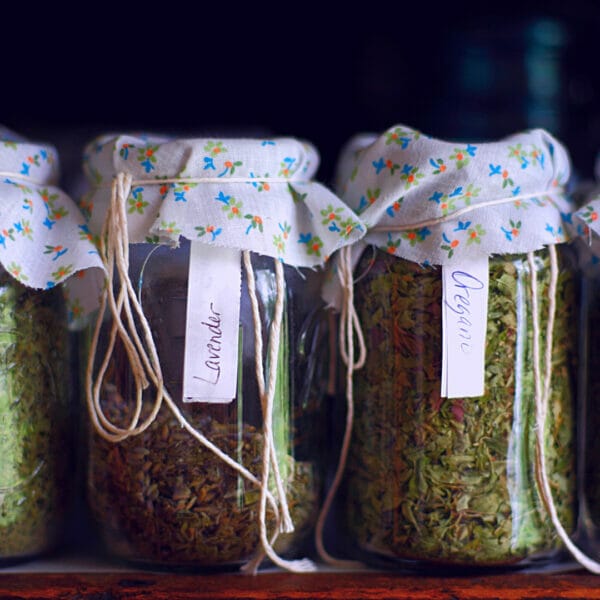
6. Keep Dried Herbs in a Cool Place
It’s convenient to store herbs in the cupboard next to your stove, but it’s not ideal for the shelf life of your herbs. Changing temperatures or constant warm/hot temps causes premature flavour loss in your herbs.
REALITY CHECK! Like many kitchens, I have a spice cupboard next to my stove, so my herbs and spices are at risk. To accommodate for this, I keep two sets of herb jars. I keep a big jar of whole leaves (not crumbled) in my dark, dry, cool pantry in the basement and a little jar for every day use in the cupboard next to my stove. When I run out of herbs in the kitchen, I refill with herbs from the large jar. It’s extra work every few months, but it keeps my herbs tasting and smelling great!
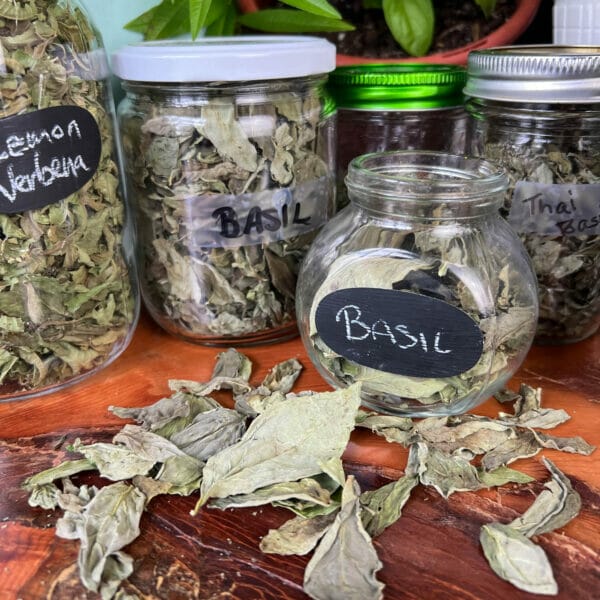
Can I Store Dried Herbs in the Freezer?
Yes! The constant cold temperature of the freezer will definitely keep dried herbs fresh and tasty for longer. Just be careful when you move herbs from the freezer to room temperature to avoid condensation forming in the container. Work quickly to transfer the amount of herbs you need and return the remainder to the freezer quickly.
How Long Do Dried Herbs Last?
Every herb has a slightly different shelf life when dried. Most will last at least 8 to 12 months. With proper storage, some can even remain flavourful for up to 3 years (rosemary, sage, thyme). But some like dill, parsley, cilantro and chives lose their flavour much more quickly. That’s why I recommend freezing these herbs.
Some fresh herbs like lemon balm, tarragon or specialty mints (strawberry mint) don’t hold their flavour very well when dried. To be honest, they’re not great when frozen either. These are herbs I enjoy during the summer months or use to make herb butter, infused vinegar or infused simple syrup.
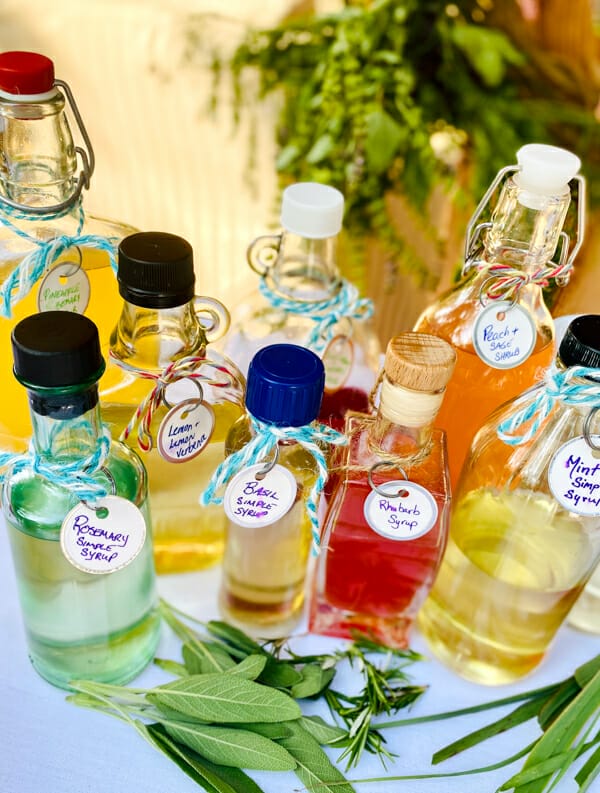
Which Drying Method is Best?
You can dry herbs using a dehydrator, microwave, oven or by simply air drying. They can all be very effective as long as you follow the recommendations for each method. It’s best to look up a specific herb to learn more about the best way to preserve it.
In the microwave or oven burning the herbs or drying them at temperatures too high can ruin the essential oils, but it is quicker than air drying or using the dehydrator. A dehydrator uses electricity and can take a long time, but it is controlled and bug free. Air drying is the oldest method around and works great, especially in dry climates. Do what works best for you and what equipment you have available to you!
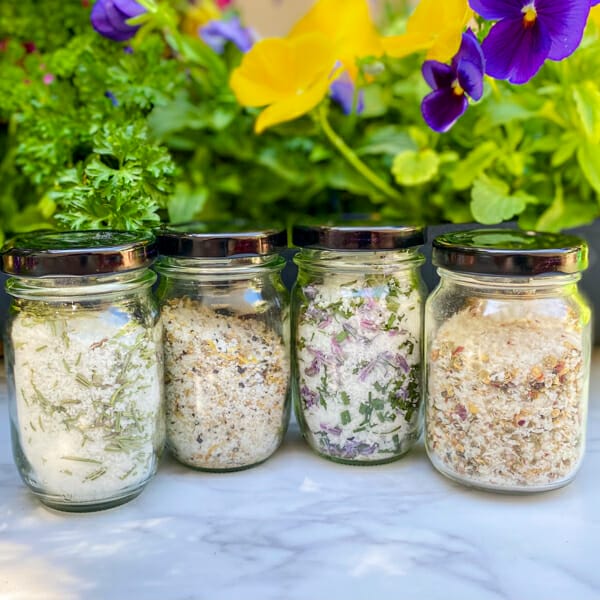
What are Other Ways to Preserve Herbs?
- Herb Butter – great for fresh herbs like chives, garlic chives, tarragon, oregano, parsley
- Infused Vinegar – try it with chive blossoms, oregano, tarragon, rosemary
- Finishing Salts – delicious and pretty for just about any fragrant herb
- Homemade Seasoning Blends – build your own blends with a variety of dried herbs and spices
- Pesto – make a Pesto using herbs other than basil – the process is the same, just swap the herb
Want more details? Prefer visuals – check out my extensive library of Herb videos on YouTube. The herb videos get a lot of compliments for being short, direct to the point and very helpful. Go have a look.
Getty’s Herb Playlist on YouTube
What herbs are you drying this year? Comment below or share your photos with me on Instagram @getgettys or Facebook @GettyStewart.HomeEconomist.



 Subscribe to Getty's YouTube channel
Subscribe to Getty's YouTube channel